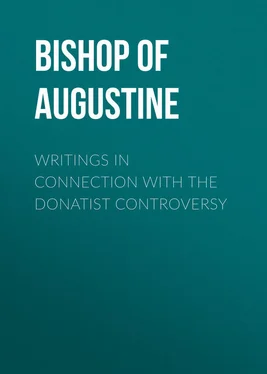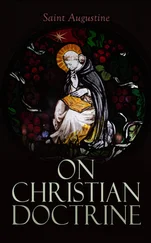Saint Augustine - Writings in Connection with the Donatist Controversy
Здесь есть возможность читать онлайн «Saint Augustine - Writings in Connection with the Donatist Controversy» — ознакомительный отрывок электронной книги совершенно бесплатно, а после прочтения отрывка купить полную версию. В некоторых случаях можно слушать аудио, скачать через торрент в формате fb2 и присутствует краткое содержание. Жанр: foreign_antique, foreign_prose, на английском языке. Описание произведения, (предисловие) а так же отзывы посетителей доступны на портале библиотеки ЛибКат.
- Название:Writings in Connection with the Donatist Controversy
- Автор:
- Жанр:
- Год:неизвестен
- ISBN:нет данных
- Рейтинг книги:3 / 5. Голосов: 1
-
Избранное:Добавить в избранное
- Отзывы:
-
Ваша оценка:
- 60
- 1
- 2
- 3
- 4
- 5
Writings in Connection with the Donatist Controversy: краткое содержание, описание и аннотация
Предлагаем к чтению аннотацию, описание, краткое содержание или предисловие (зависит от того, что написал сам автор книги «Writings in Connection with the Donatist Controversy»). Если вы не нашли необходимую информацию о книге — напишите в комментариях, мы постараемся отыскать её.
Writings in Connection with the Donatist Controversy — читать онлайн ознакомительный отрывок
Ниже представлен текст книги, разбитый по страницам. Система сохранения места последней прочитанной страницы, позволяет с удобством читать онлайн бесплатно книгу «Writings in Connection with the Donatist Controversy», без необходимости каждый раз заново искать на чём Вы остановились. Поставьте закладку, и сможете в любой момент перейти на страницу, на которой закончили чтение.
Интервал:
Закладка:
Chap. v. – 7. But if any one should ask what I hold in the meantime, while discussing this question, I answer that, in the first place, the letter of Cyprian suggested to me what I should hold till I should see clearly the nature of the question which next begins to be discussed. For Cyprian himself says: "But some will say, 'What then will become of those who in times past, coming to the Church from heresy, were admitted without baptism?'" 120 120 Epist. lxxiii. sec. 20, to Jubaianus.
Whether they were really without baptism, or whether they were admitted because those who admitted them conceived that they had partaken of baptism, is a matter for our future consideration. At any rate, Cyprian himself shows plainly enough what was the ordinary custom of the Church, when he says that in past time those who came to the Church from heresy were admitted without baptism.
8. For in the Council itself Castus of Sicca says: "He who, despising truth, presumes to follow custom, is either envious or evil-disposed towards the brethren to whom the truth is revealed, or is ungrateful towards God, by whose inspiration His Church is instructed." 121 121 Conc. Carth. sec. 28.
Whether the truth had been revealed, we shall investigate hereafter; at any rate, he acknowledges that the custom of the Church was different.
Chap. vi. – 9. Libosus also of Vaga says: "The Lord says in the gospel, 'I am the Truth.' 122 122 John xiv. 6.
He does not say, 'I am custom.' Therefore, when the truth is made manifest, custom must give way to truth." 123 123 Conc. Carth. sec. 30.
Clearly no one could doubt that custom must give way to truth where it is made manifest. But we shall see presently about the manifestation of the truth. Meanwhile he also makes it clear that custom was on the other side.
Chap. vii. – 10. Zosimus also of Tharassa said: "When a revelation of the truth has been made, error must give way to truth; for even Peter, who at the first circumcised, afterwards gave way to Paul when he declared the truth." 124 124 Ib. sec. 56.
He indeed chose to say error, not custom; but in saying "for even Peter, who at the first circumcised, afterwards gave way to Paul when he declared the truth," he shows plainly enough that there was a custom also on the subject of baptism at variance with his views. At the same time, also, he warns us that it was not impossible that Cyprian might have held an opinion about baptism at variance with that required by the truth, as held by the Church both before and after him, if even Peter could hold a view at variance with the truth as taught us by the Apostle Paul. 125 125 Gal. ii. 11-14.
Chap. viii. – 11. Likewise Felix of Buslacene said: "In admitting heretics without the baptism of the Church, let no one prefer custom to reason and truth; because reason and truth always prevail to the exclusion of custom." 126 126 Conc. Carth. sec. 63.
Nothing could be better, if it be reason, and if it be truth; but this we shall see presently. Meanwhile, it is clear from the words of this man also that the custom was the other way.
Chap. ix. – 12. Likewise Honoratus of Tucca said: "Since Christ is the Truth, we ought to follow truth rather than custom." 127 127 Ib. sec. 77.
By all these declarations it is proved that we are not excluded from the communion of the Church, till it shall have been clearly shown what is the nature of the truth, which they say must be preferred to our custom. But if the truth has made it clear that the very regulation ought to be maintained which the said custom had prescribed, then it is evident, both that this custom was not established or confirmed in vain, and also that, in consequence of the discussions in question, the most wholesome observance of so great a sacrament, which could never, indeed, have been changed in the Catholic Church, was even more watchfully guarded with the most scrupulous caution, when it had received the further corroboration of Councils.
Chap. x. – 13. Therefore Cyprian writes to Jubaianus as follows, "concerning the baptism of heretics, who, being placed without, and set down out of the Church," seem to him to "claim to themselves a matter over which they have neither right nor power. Which we," he says, "cannot account valid or lawful, since it is clear that among them it is unlawful." 128 128 Cypr. Ep. lxxiii. sec. 1.
Neither, indeed, do we deny that a man who is baptized among heretics, or in any schism outside the Church, derives no profit from it so far as he is partner in the perverseness of the heretics and schismatics; nor do we hold that those who baptize, although they confer the real true sacrament of baptism, are yet acting rightly, in gathering adherents outside the Church, and entertaining opinions contrary to the Church. But it is one thing to be without a sacrament, another thing to be in possession of it wrongly, and to usurp it unlawfully. Therefore they do not cease to be sacraments of Christ and the Church, merely because they are unlawfully used, not only by heretics, but by all kinds of wicked and impious persons. These, indeed, ought to be corrected and punished, but the sacraments should be acknowledged and revered.
14. Cyprian, indeed, says that on this subject not one, but two or more Councils were held; always, however, in Africa. For indeed in one he mentions that seventy-one bishops had been assembled, – to all whose authority we do not hesitate, with all due deference to Cyprian, to prefer the authority, supported by many more bishops, of the whole Church spread throughout the whole world, of which Cyprian himself rejoiced that he was an inseparable member.
15. Nor is the water "profane and adulterous" over which the name of God is invoked, even though it be invoked by profane and adulterous persons; because neither the creature itself of water, nor the name invoked, is adulterous. But the baptism of Christ, consecrated by the words of the gospel, is necessarily holy, however polluted and unclean its ministers may be; because its inherent sanctity cannot be polluted, and the divine excellence abides in its sacrament, whether to the salvation of those who use it aright, or to the destruction of those who use it wrong. Would you indeed maintain that, while the light of the sun or of a candle, diffused through unclean places, contracts no foulness in itself therefrom, yet the baptism of Christ can be defiled by the sins of any man, whatsoever he may be? For if we turn our thoughts to the visible materials themselves, which are to us the medium of the sacraments, every one must know that they admit of corruption. But if we think on that which they convey to us, who can fail to see that it is incorruptible, however much the men through whose ministry it is conveyed are either being rewarded or punished for the character of their lives?
Chap. xi. – 16. But Cyprian was right in not being moved by what Jubaianus wrote, that "the followers of Novatian rebaptize those who come to them from the Catholic Church." 129 129 Cypr. Ep. lxxiii. sec. 2.
For, in the first place, it does not follow that whatever heretics have done in a perverse spirit of mimicry, Catholics are therefore to abstain from doing, because the heretics do the same. And again, the reasons are different for which heretics and the Catholic Church ought respectively to abstain from rebaptizing. For it would not be right for heretics to do so, even if it were fitting in the Catholic Church; because their argument is, that among the Catholics is wanting that which they themselves received whilst still within the pale, and took away with them when they departed. Whereas the reason why the Catholic Church should not administer again the baptism which was given among heretics, is that it may not seem to decide that a power which is Christ's alone belongs to its members, or to pronounce that to be wanting in the heretics which they have received within her pale, and certainly could not lose by straying outside. For thus much Cyprian himself, with all the rest, established, that if any should return from heresy to the Church, they should be received back, not by baptism, but by the discipline of penitence; whence it is clear that they cannot be held to lose by their secession what is not restored to them when they return. Nor ought it for a moment to be said that, as their heresy is their own, as their error is their own, as the sacrilege of disunion is their own, so also the baptism is their own, which is really Christ's. Accordingly, while the evils which are their own are corrected when they return, so in that which is not theirs His presence should be recognised, from whom it is.
Интервал:
Закладка:
Похожие книги на «Writings in Connection with the Donatist Controversy»
Представляем Вашему вниманию похожие книги на «Writings in Connection with the Donatist Controversy» списком для выбора. Мы отобрали схожую по названию и смыслу литературу в надежде предоставить читателям больше вариантов отыскать новые, интересные, ещё непрочитанные произведения.
Обсуждение, отзывы о книге «Writings in Connection with the Donatist Controversy» и просто собственные мнения читателей. Оставьте ваши комментарии, напишите, что Вы думаете о произведении, его смысле или главных героях. Укажите что конкретно понравилось, а что нет, и почему Вы так считаете.












